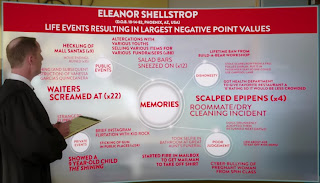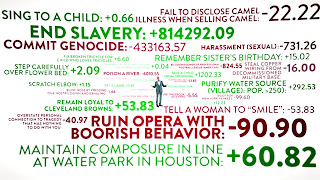Judgement and rewards

Michael: Let’s hear about the tee shirts, please. Eleanor: Eeh, OK. I’ll tell you – but it doesn’t make me look great, so don’t judge me. Michael: That’s literally the purpose of this entire exercise. (Season 1, episode 8) The idea of evaluating a person’s life comes up quite a bit on The Good Place . This is an important theme in Christianity too, but in a different way: not to determine if people are worthy of heaven (which is a free gift and not earned), but as a time of getting everything out in the open. Every person will stand before Jesus individually and answer for the things they did on earth, good and bad. For those who are already forgiven, this isn’t a shameful time of having their nose rubbed in their sins – a terrible lie some people believe – but an opportunity for Jesus to reward his people for even little things they did out of love, and publicly praise them (which will be overwhelming). Those who haven’t accepted God’s forgiveness will see the reality of





